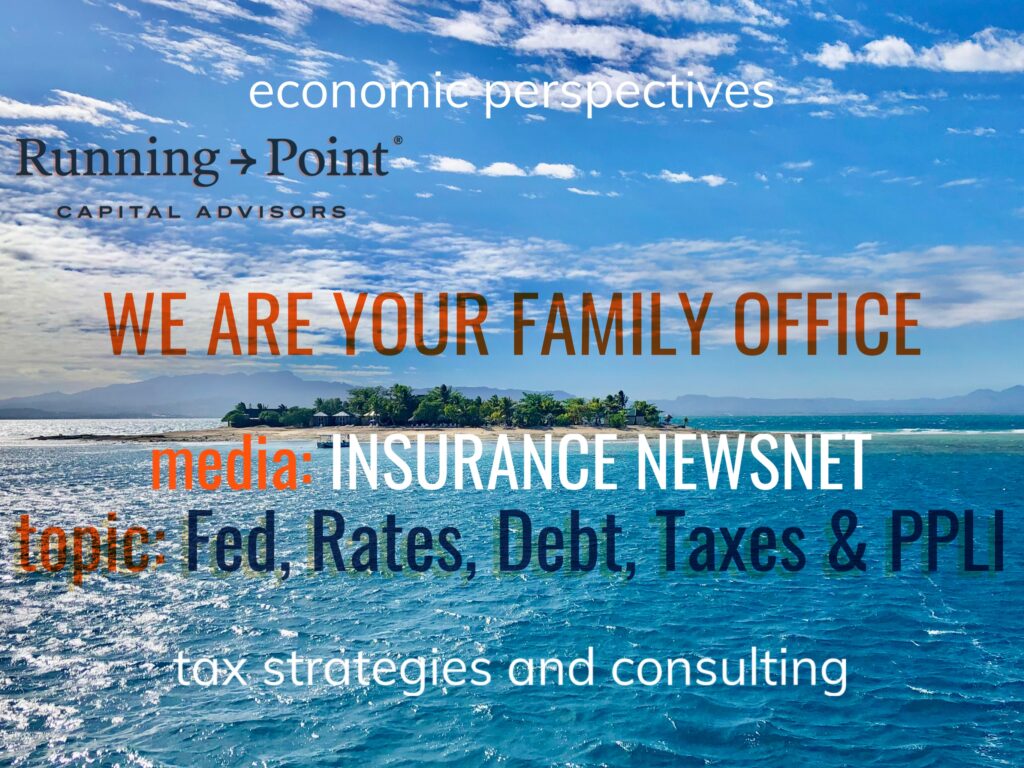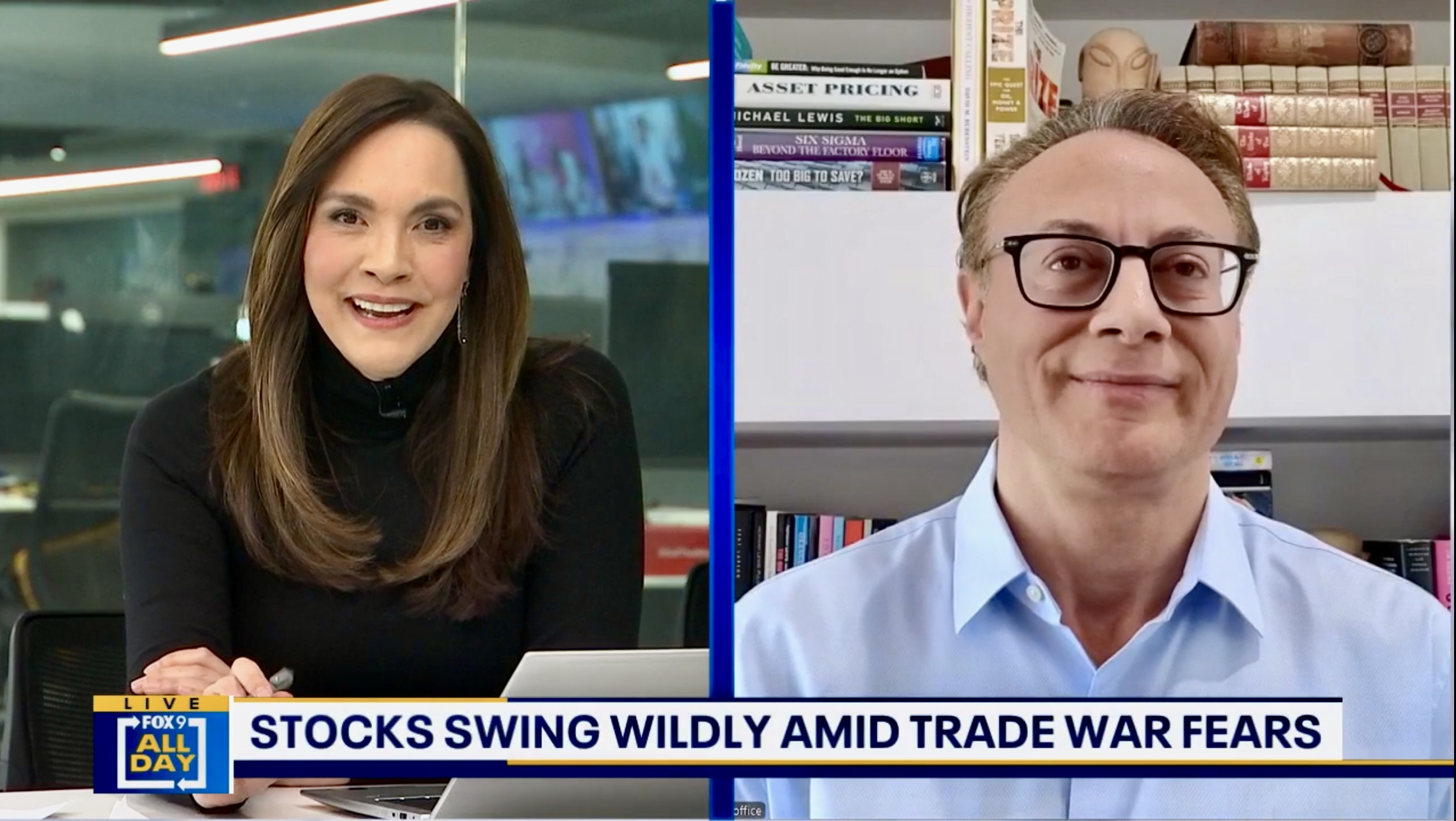Higher taxes likely; PPLI could be a solution
What is happening with interest rates, inflation, and the Federal Reserve and how can insurance fit into the equation? Running Point and its chief investment officer, Michael Ashley Schulman, CFA, were quoted in an Insurance NewsNet article—by Doug Bailey, “Some optimistic Fed can hit elusive 2% inflation target in early 2024”—regarding whether the Fed can achieve its inflation target and the possible economic effects.
The advantages of PPLI in a high tax environment
Private placement life insurance (PPLI) is a strong option for generational and multigenerational wealth building in a high tax environment. It retains the tax benefits of an insurance policy, allows for loans on the accumulated value, charges no commissions, is professionally managed, and has the opportunity for a significant array of investment choices — including diversification into stocks, bonds, private credit, hedge funds, real estate debt, private equity, secondary funds, and other appealing strategies.
What is the Federal Reserve doing?
Persistent inflation: The Federal Reserve was too loose and generous with its monetary policy in 2021 and has been trying to reverse that error for over 18 months. Chairman Jerome Powell finally started raising rates in 2022 because he was “fed up” with sticky inflation that was well above his 2% target and the strong U.S. economy has emboldened him to tighten policy further.
Fed signposting: However, sometimes even more important than the actual amount of interest raise are the messages the Fed and its Board members release with the interest rate moves and how investors interpret those statements. Do the Fed’s statement and Chair Jerome Powell’s follow-up interviews instill confidence in the economy, assuring that the Fed can control inflation without pushing the U.S. into a recession? Or does an already skeptical audience further believe that the Fed has no control over food, oil, and other prices?
Monetary vs. fiscal policy: It is important to understand that the Fed is not only fighting inflation but also indirectly fighting government fiscal policy. The Federal Reserve and the U.S. Executive Branch (as well as Congress) have had opposing goals in 2022 and 2023. The Fed has been attempting to slow the economy and increase unemployment to alleviate wage pressures while the Biden Administration has attempted the opposite by stimulating to improve household income, decrease personal expenses, and avoid recession.
Central banks: If Christine Lagarde of the European Central Bank (ECB) and her counterpart Jerome Powell at the Federal Reserve were to suddenly pivot and lower interest rates, the stimulus created would probably swerve the global economy away from talk of a recessionary trajectory, but may overly stimulate us back toward high inflation and short-term supply shortages.
Inflation targeting: There is a remote chance that the Fed changes their inflation target from 2% to 3% and then declares victory, but I suspect they may signpost before making such a bold move which would have the ancillary effect of raising real interest rates and resetting financial and investment models.
Increased taxes leads to more tax planning: It seems inevitable that high Fed interest rates will increase U.S. debt burden and debt payments, and lead to higher taxes. Where appropriate, we may advise families to use private placement life insurance and variable annuities (PPLI and PPVA) for a segment of their investment and estate planning strategies to help protect family wealth from high taxes now and in the future. Please reach out to us.
Article excerpt is below:
“Confidence is the cheapest stimulus for the economy and business planning, but the Fed wants to walk and talk the fine line between confidence and over-confidence,” said Michael Ashley Schulman, partner and chief investment officer at Running Point Capital Advisors. “If the U.S. enters a recession soon, it would be a most unusual recession with plentiful credit, low unemployment, and above average inflation—noteworthy dynamics not normally associated with an economic slowdown.”

Disclosure: The opinions expressed are those of Running Point Capital Advisors, LLC (Running Point) and are subject to change without notice. The opinions referenced are as of the date of publication, may be modified due to changes in the market or economic conditions, and may not necessarily come to pass. Forward-looking statements cannot be guaranteed. Running Point is an investment adviser registered with the U.S. Securities and Exchange Commission. Registration does not imply a certain level of skill or training. More information about Running Point’s investment advisory services and fees can be found in its Form ADV Part 2, which is available upon request. RP-23-90


